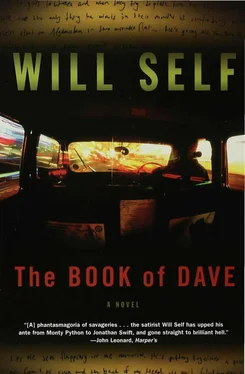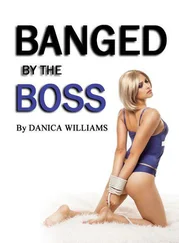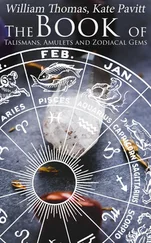12. The Book of Dave: October 2000
Achilles was getting off his plinth; first one big foot then the other tore from its base with a tortured screech. He cut at the rags of mist with his short sword and brandished his shield at the Hilton Hotel. A couple of early-bird tourists who had been posing for a snap in front of the statue — male pecking with camera, female with wings neatly folded — were struck to the ground by one of Achilles's bulldozing greaves, as he clunked by them heading for Apsley House. He did not waver — he had no quarrel with them. He took no issue either with the cars he kicked as he strode across the roadway and on to the traffic island. Seven metres of bronze against two-millimetre thicknesses of steel — there was no contest; in the statue's wake smashed vehicles lay on their sides, their engines racing and groaning.
Lit by the rising sun, fingernails of opalescent cloud scratched contrails on the sky. Achilles stood beneath Constitution Arch and beat shield with sword. With a bang, then a spatter of stony fragments, the four horses atop the arch came alive, tossing their leaden heads. The boy holding the traces struggled to control them. Peace, erect in her chariot, her robe coming off her shoulder in rigid folds, flicked the reins and the whole, mighty quadriga rose, banked sharply and came crunching down. Peace threw her laurel wreath like a frisbee, and Achilles caught it on his sword.
The other statues on the traffic island were animating: the Iron Duke spurred down his horse, Copenhagen; the bronze figures that attended him — Guard, Dragoon, Fusilier and Highlander — wrenched themselves free from the polished granite and fell in behind their commander-in-chief. On the Royal Regiment of Artillery memorial the dead gunner rose up from under his petrified greatcoat and joined his comrades. Together they unlimbered their stone field gun. David, tall, svelte and naked, shimmied from the Machine Gun Corps memorial — sword in one hand, Bren gun in the other. These terrible figures stood apart, turning to face down Piccadilly, Knightsbridge, Grosvenor Place and Park Lane, undecided what to do now movement had been bestowed upon them. The few pedestrians who were abroad at this early hour scattered like rabbits, tearing between the trees of Green Park, discarding briefcases and umbrellas as they ran, while those drivers not violently impinged on remained oblivious, their heads clamped in their own metal tumult. The company of statues formed up, with Achilles in the van and Peace to the rear. They marched off down Constitution Hill, feet striking sparks as they clanked over the kerbs.
All across London, as the statues came to life, they were at first bemused — then only with reluctance purposeful. Clive of India jumped from his plinth and took the stairs down to Horse Guards skipping. Lincoln at first sat down, surprised, then, struggling up from his chair in Parliament Square, crossed over to the menhir bulk of Churchill, took his arm and assisted him to walk. Earl Haig led his mount alongside Montgomery, who was preposterous in his dimpled elephantine trousers. In Knightsbridge, Shackleton and Livingstone stepped out from their niches in the Royal Geographical Society. Golden Albert squeezed between the gilded stanchions of his memorial, and those blowzy ladies Europe, Africa, Asia and America formed a stony crocodile in his train. In Waterloo Place, Scott strolled up and down the pavement, striking a few attitudes, modelling his Burberry outfit.
In Chelsea, Thomas More stood up abruptly, his golden nose flashing; while across the river the droopy-eared Buddhas were stirring in their pagoda. Up in Highgate Cemetery the colossal head of Marx wobbled, then rolled downhill over the mounds of freshly dug graves. They were all heading for Trafalgar Square, where five-metre-high Nelson was gingerly shinnying down his own column, while Edith Cavell tripped past St Martin-in-the-Fields, her marble skirts rattling against the pedestrian barriers.
Not only human figures were on the move but animals as well: packs of stone dogs and herds of bronze cattle. Guy the Gorilla knuckle-walked out of London Zoo and around the Outer Circle; the dolphins slithered from the lamp-posts along the Thames and flopped into town. Mythical creatures joined the throng closing in on Trafalgar Square: riddling sphinxes, flying griffins and even the ill-conceived Victorian dinosaurs came humping overland from Crystal Palace. The whole mad overwrought bestiary arrived ramping and romping. The Landseer lions rose up to meet them, stretched and soundlessly roared.
Multiples of monarchs: doughty Williams, German Georges, dumpy Victorias. Presses of prime ministers, scrums of generals and colonial administrators, flying vees of viceroys, gaggles of writers and artists, cohorts of Christs — from facades and niches, plinths and pediments, crucifixes and crosses, the statues of London tore themselves free, until the whole centre of the city was a heaving hubbub of tramping bronze, clanking cast-iron, grating granite and marble. These graven images, these tin-pot gods! They had no more uniformity of purpose than they did of style, substance or scale — giant warmongers and diminutive deities, they were distorted embodiments of their creators' confused and ever-changing priorities. They didn't mean to cause any damage or distress — but they just did. They left pediments bare and cornices crumpling, domes imploded, porticos and bridges slumped, colonnades collapsed. They didn't mean to hurt the soft little people, but they were so big and hard that skins were split and skulls were crushed wherever they went.
Standing on the steps of Nelson's column, Achilles beat sword on shield, trying to gain the statues' attention. It was pointless — these hunks could make no common cause, they knew nothing, felt nothing — only the rage of eternal sleepers robbed of their repose. Greek gods and goddesses stood about in profile; Saint Thomas à Becket writhed in his death agony; Baden-Powell scouted out the terrain. Slowly — lazily even — the statues began to fight one another. Marble clanged on iron, granite on bronze, as the maddened effigies battled with the incomprehensibility of their own sentience. What were they? Nothing. So sightlessly stared through for so very long that they had no more significance than a dustbin or a postbox — less perhaps.
Then there was a diversion — some dumb cabbie had managed to wrestle his vehicle free from the jam on the Charing Cross Road, and now he was trying to turn around in the roadway beneath the National Gallery. He backed and filled, knocking fauns, cherubs and caryatids over like ninepins. Achilles leaped down from his vantage and strode over. He leaned down, and his disproportionately tiny cock rasped along the cab's roof, shattering the 'For Hire' sign …
'Bash! Bash! Bash!' Something was bashing against the driver window of the Fairway. Dave Rudman came to in a flurry of anxiety to find he was parked up on Goods Way behind King's Cross Station. A big cop was knocking on the outside of the window so hard that Dave's head was bouncing off it. As he bent to hit the button, he saw a three-quarters-empty whisky bottle lying on the floor between his trainers. He hooked it out of sight beneath the seat. 'Morning,' the cop said. He was plainclothes; behind him two others were propped against a big estate car, unmarked except for the revolving blue light stuck on its roof. A steely sun was beating down on the gasometers along Battle Bridge Road. 'Funny place to be having a kip.' The cop's face was pink and also unmarked. His grin was wolfish — his full head of silvery hair as neat as the clippers that had cut it.
'I–I, I had a late drop and … I …' Dave couldn't make any of it work for him: the sentence, the thoughts to build it and the will to power it forward. As he became more conscious, so he became more frighteningly aware of the fag ash and booze reek, his crumpled clothes and stubbly muzzle.
Читать дальше












